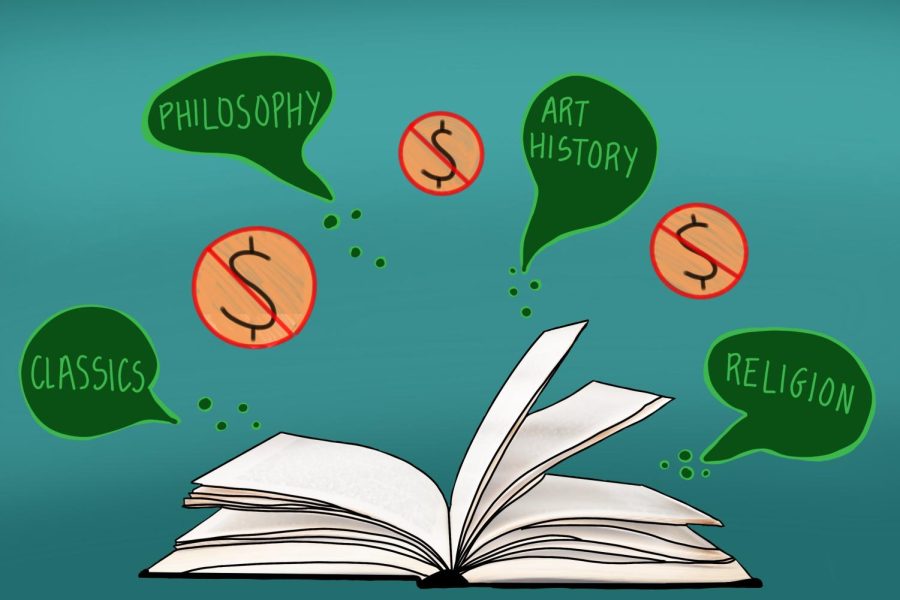Northwestern professors express support for liberal arts departments amid nationwide cuts
Liberal arts helps students become more informed and educated citizens, according to art history Prof. Thadeus Dowad.
April 2, 2023
Despite receiving federal COVID-19 relief funds, several universities across the country experienced large budget shortfalls this past year. Some financially struggling universities resorted to cutting or shrinking liberal arts departments.
In February, Marymount University in Virginia plans to cut philosophy, art, history and English, among other programs. The University of Alaska has discontinued or scaled back more than 40 programs, most of which are liberal arts-oriented departments. Though Northwestern did not announce a budget deficit or department cuts, professors still said losing liberal arts departments has real impacts across the country.
Art history Prof. Alicia Caticha said she is not concerned for the future of NU’s Art History Department because of its rich history and connections to the Chicago art scene. But she expressed fear for the future of the humanities nationwide.
“People are going to go into the world without this understanding of where we came from,” Caticha said.
Caticha said cutting liberal arts programs removes students’ access to knowledge about how the world works. Having a complex understanding of visual media requires critical thinking skills, she said, which students can develop in art history classes. Art history gives context to and explains visual trends happening today, such as the viral AI image of the Pope wearing a white puffer coat, she said.
Caticha said the humanities receive less attention because these departments systematically bring in smaller grants. Even STEM professors that focus on theory instead of running big labs are less valued, she added.
Philosophy Prof. Axel Mueller said eliminating humanities departments is a shortsighted decision. He said that no other institution in the US exists to explore the questions that the humanities grapple with.
Mueller, who is also the director of undergraduate studies in the Department of Philosophy, said the national post-industrial society views colleges as a way to boost economic development. But universities have a social responsibility to explore the human condition and create a more educated society, he said.
Caticha said there is more hesitancy among parents for their children to major in art history, because the art market is vast.
“STEM is very sexy, and parents paying a lot of money for college want outcomes and they can’t see clear outcomes,” Caticha said. “You will find art history is useful in ways you did not realize.”
Caticha added the sciences and the humanities are more intertwined than people believe. Students in STEM need to have an understanding of the history and philosophy of their field.
According to Mueller, the cost of college sometimes scares students away from liberal arts, but Mueller said a student’s major is not the sole predictor for their future income or employment.
Mueller said a student’s relationship with professors can predict future outcomes more than their major. He added the general intelligence liberal arts provides is a useful tool experts in any career path rely on.
“The record is by no means clear that as an English major, you must earn less money than an engineering major,” he said.
Art history Prof. Thadeus Dowad said he understands students’ fears about the humanities, especially students who can’t rely on their families for financial support.
Still, he said students have a misconception that they won’t be successful or hireable if they major in humanities. While he said students often view the humanities as “fluffy” and believe they can gain an understanding of literature and history through pop culture, Dowad said digging into material with an expert is not comparable to anything else.
“We’re really developing fully fleshed minds,” Dowad said. “Students who are really good at writing, arguing and seeing situations from many different vantage points can take that set of skills anywhere.”
Mueller said he looked forward to the philosophy department continuing to evolve and include more diverse perspectives.
Similarly, Dowad and Caticha said the Art History department continues to grow and a new professor joined the department last year.
“Without a liberal arts education, you’re missing a huge dynamic facet of human existence,” Dowad said. “A liberal arts education is trying to get you to…be an engaged, informed citizen of the world we live in today.”
Email: KristenAxtman2025@u.northwestern.edu
Twitter: @KristenAxtman1
Related Stories:
— Schapiro emphasizes importance of liberal arts education during Wilmette talk
— President Morton Schapiro talks liberal arts with Political Union
— Letter: The importance of foreign language education and the liberal arts


